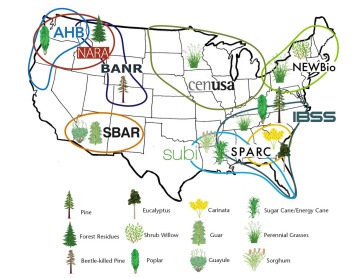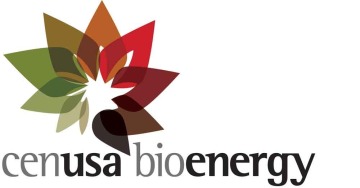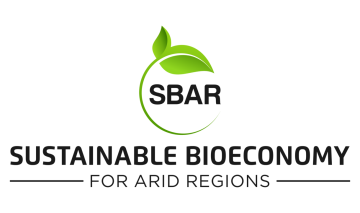
A National Approach to Bioproducts
The USDA National Institute of Food and Agriculture (NIFA) awarded Agriculture and Food Research Initiative (AFRI) grants to nine regional Coordinated Agricultural Projects (CAP) to develop sustainable bioproducts, including SBAR. All of the projects are collaborations between numerous educational institutions and private industry partners.

The Advanced Hardwood Biofuels (AHB) project, led by the University of Washington, is researching and developing ways to grow and convert hybrid poplars into bio-based chemicals and liquid biofuels in the Pacific Northwest.

In the Rocky Mountains, the Bioenergy Alliance Network of the Rockies (BANR) is investigating use of insect-killed trees as a sustainable feedstock. Colorado State University leads the project and works with other universities and industry partners to develop biofuels and biochar.
Visit the BANR project website

In the Midwest, CenUSA Bioenergy is investigating the creation of sustainable biofuels and bioproducts using perennial grasses. The project, led by Iowa State University, is also working on producing biochar as a soil amendment. The perennial grasses increase carbon sequestration and improve the sustainability of existing cropping systems by reducing agricultural runoff of nutrients and soil.
Visit the CenUSA Bioenergy project website

The Southeastern Partnership for Integrated Biomass Supply Systems (IBSS) is investigating the production of biofuels and bioproducts from switchgrass, pine, poplar, and eucalyptus. The project, led by the University of Tennessee, includes a focus on economic and environmental barriers to sustainable biofuel and bioproduct production.
Visit the IBSS project website

The Northwest Advanced Renewable Alliance (NARA), led by Washington State University, is researching how to convert forest residuals, including forest and mill residues and construction waste, into bio-jet fuel and other co-products.
Visit the NARA project website

The Northeast Woody/Warm-season Biomass Consortium (NEWBio) is investigating a variety of feedstocks for advanced biofuels including willow, switchgrass, and miscanthus. Led by by Penn State University, NEWBio is also looking into alternative markets for cellulosic bioenergy crops.
Visit the NEWBio project website

The Sustainable Bioeconomy for Arid Regions (SBAR) Center of Excellence works to optimize and integrate the production of guayule and guar to enable the Southwest U.S. to significantly impact biofuel and other high-value product markets. SBAR is led by the University of Arizona.
Visit the SBAR project website

In the Southeast, SPARC is working to establish over 800,000 acres of carinata as a viable winter crop, to create a carinata centered advanced renewables and coproduct supply chain in the region with national and global impact. SPARC is a collaboration of Southeast universities and industry partners, led by the University of Florida.
Visit the SPARC project website

In the Gulf States, the Sustainable Bioproducts Initiative (SUBI) is led by Louisiana State University AgCenter. SUBI is planning to use existing refinery infrastructure in the Southeast to convert energycane and sweet sorghum into biofuels and bioproducts.
Visit the SUBI project website

